Water is a very important element in any home. Aside from drinking, water is used for bathing, cooking, and cleaning, which is why having clean, quality water is essential.
However, water provides for a suitable environment where various degrees of harmful contaminants, organic matter, and microorganisms live. Even treated water sources from cities might not be 100% reliable, especially if the water runs through old and rusty pipes.
To ensure your home gets a clean water supply, you can count on home water filter systems to remove various harmful contaminants. However, when picking the best water filter, you need to consider its advantages. Some water filters can treat lead or iron better than others whereas models with a built-in water softener can help treat hard sediments like calcium.
We understand that this can be quite confusing, so we have spent hours researching proven NSF Certified well water filtration systems to help you decide on the best one for your house. Whether you need the best sediment filter for wall water or the best filter system to get rid of bacteria, we’ve got you covered with our top picks of the best whole house water filters for well water below.
Best Well Water Filtration System Buying Guide – What You Need to Know
Did you know more than half of private well owners in America face serious water quality issues? While these issues can be solved with proper filtration, picking the perfect filter is a challenge and an investment, so this is definitely a purchase that you want to get right the first time.
To help you out, we have prepared a comprehensive buying guide below to help you choose the best system for well water.
Why a Good Whole House Water Filter System For Well Water is Important
Municipal water is frequently and continually monitored and disinfected by regulators. In fact, the EPA sets strict limits for hazardous substances present in the water. This includes levels of toxic chemicals and disease-causing bacteria so that the public is assured that the water they drink is safe for consumption.
However, private wells do not have regulatory safeguards. While many homeowners believe that their supply is free from contaminants since they come fresh from the ground, the reality is far from the truth as unfiltered water can also be risky.
In fact, a USGS study conducted in 2009 found that at least 20% of private wells are contaminated with harmful levels of hazardous substances. Others have hard water with high levels of calcium and magnesium that are healthy for consumption but can have serious side effects on clothing, plumbing, and electrical appliances at home.
A simple water quality test can be conducted at your home to tell you what’s in your water. But you do need to keep note that contamination risk in your watershed from landfills to industry changes over time, so there’s no guarantee that your water quality will remain the same over the years. For better peace of mind, it is recommended for you to invest in a good filtration system to protect you now and in the future.
Aspects to Consider When Buying a Whole House Water Filters For Well Water
There are a few factors that you’ll need to take into consideration when shopping for a new filtration system. That includes the following:
Contaminant Filtration Capability
The best well water filter is one that can help you remove target contaminants without breaking the bank. Target contaminants are substances that are present in your water that needs to be removed. If you live near a landfill or a large farm that uses pesticides, you might want to invest in a good filter system that can remove harmful chemicals.
A water test and some research into your area can help you identify target contaminants. Once you know your target contaminants, the next step you’ll need to do is determine your budget and choose the right filter that can remove those substances effectively for safe water consumption.
System Type
The type of filter system will determine the kind of substances it can remove. If you need the best system to get rid of high iron levels from well water, then your choices are limited to only a selected few.
However, if lead is the problem, then you can choose from carbon, KDF, or RO filtration to help you solve the problem. The goal is a well water filter system that removes target contaminants at the lowest cost while delivering maximum peace of mind.
Whole-home filters treat every gallon of water that enters your house, but the systems can occasionally be expensive, and they may not be an option if you’re living in a rented property. For situations like this, you can consider point-of-use filter models to treat the water you drink and cook at a fraction of the price.
Capacity
Non-RO water filters produce clean water on demand with no maximum daily number of gallons; however, reverse osmosis systems have a limited volume of water they can filter. This is because quality filtration takes time. You’ll then need to consider your family’s usage to get one with a capacity that matches your needs.
Flow Rate
One of the most common issues with water filters is the reduced water flow at the tap. There’s no point in showering if all you’re going to get is just a trickle of water whenever someone flushes or showers at the same time. This is where it’s important to take note of the flow rate the water filter produces.
Flow rate is measured in gallons per minute and will determine how many water-using activities you can do simultaneously in your home without experiencing a reduction in water pressure. Generally, most water-using activities require 2-3 gallons per minute, meaning a family of four should get a minimum flow rate of 6 GPM.
Micron Rating
A filter’s micron rating reflects the size of particles it can remove – the lower the micron size, the finer the molecules it can remove. However, you also want to take note as small micron filters can get clogged easily and may need to be replaced more frequently. Nonetheless, the best sediment filter should have a micron rating of no larger than five.
RO membranes have much lower micron ratings at 0.01 to 0.0001 to deliver a much more comprehensive filtration. In fact, they’re even capable of removing small bacteria at that micron size.
Maintenance
There’s more to consider than just the initial cost of a whole house water filtration system. You’ll need to factor in the maintenance cost. This is where the capacity, which is the number of gallons a system can treat before it needs to be replaced, can play a significant role.
Aside from the cost, you’ll also need to take note of their capability. Complex systems that require continual or technically challenging maintenance can be a hassle for most. Hence, it is recommended for you to look for whole house water filters with the following features:
- Tool-free filter changes
- Extended life cartridges
- Filter change indicators
- Bypass valves for filter swaps without needing to shut the main water supply
Certifications
NSF and Water Quality Association certification programs are great points to look out for when shopping for water filters as they’re an indication of how well the system will perform. They also give you a hint on the quality of the components used to build the water filter.
Best Whole House Water Filter for Well Water in 2022
1. SpringWell
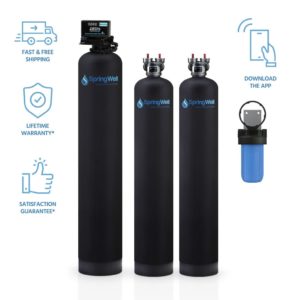
The SpringWell Whole House Well Water Filter does an amazing job at removing the three most common contaminants in well water: iron (up to 7ppm), manganese (up to 1ppm), and hydrogen sulfide (up to 8ppm) – without reducing the inlet water pressure. The water filter system is also able to help get rid of unpleasant smells, bad water taste, and staining.
The whole house water filter by SpringWell Whole House filter for well water adopts a 4-stage filtration system that includes the following:
Stage 1: Air pocket to oxidize iron, sulfur, and manganese.
Stage 2: Bed of green sand works of trap oxidized material or sulfur gas.
Stage 3: The backwash function helps to clear the contaminates out of the bed down a drain to reset the fresh pocket of air.
Stage 4: Clean, fresh, and clear water is distributed throughout the home.
On top of its 4-stage filtration system, Springwell uses the latest parts and components in their system such as a programmable Bluetooth head that controls the daily backwash to remove accumulated well water contaminants and replenish the filtration media bed. The whole house filter also features a state-of-the-art tank design for increased efficiency and a 10% cross-linked resin that will last twice as long as normal resin.
Owners even have the option to add on a UV Water Purification System that’s proven to kill microbiological issues including E. coli, cryptosporidium, and giardia lamblia. The UV light is able to kill up to 99.9% of harmful pathogens, viruses, and bacteria.
The kit comes complete with everything you need for a DIY-friendly installation. The brand also offers a 6-months money-back guarantee and industry-leading lifetime warranty for the best durability and peace of mind.
The SpringWell Whole House Water Filter System helps you get rid of rotten egg sulfur odor and tough-to-clean calcium stains along with the capability to remove up to 8 PPM (among the highest in the industry) of manganese and hydrogen sulfide. The water filter system even features the best sediment filter to protect fragile media within it to enhance both performance and durability with a promise to last a lifetime.
Pros:
- User-friendly digital interface with Bluetooth connectivity.
- Easy maintenance with a backwash system.
- Certified and up-to-date components.
- Satisfaction guaranteed with 6-months money back.
- Lifetime warranty.
Cons
- Expensive upfront cost.
2. Aquasana EQ-Well
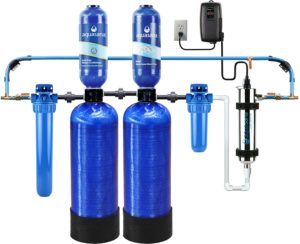
Aquasana Whole House Water Filtration System is a comprehensive solution for homeowners to tackle tough water quality issues with the ability to remove up to 97% of dangerous contaminants originating from the agricultural and heavy metals industry. The water filter system offers superior filtration with a filter combination that’s designed to help remove almost everything from impure well water.
The whole house water filter package includes:
- A sediment filter to trap rust, sediment, and silt.
- A built-in descaling system made with copper-zinc and mineral stone to remove scale and prevent limescale buildup, water-soluble heavy metals like lead and mercury, and to inhibit bacteria and algae growth without using salt or conventional softeners.
- Activated carbon block filter to get rid of pesticides, herbicides, and other harmful chemical compounds. The activated carbon also helps to deodorize and get rid of unpleasant taste.
- A post-filter to trap any remaining sediment and organic particles.
- A powerful UV filter destroys 99.99% of microorganisms like bacteria, viruses, and cysts (cryptosporidium and giardia).
While the Aquasana filter may not be the best choice for filtering iron from your well water, it does produce gallons and gallons of the cleanest, and freshest water in a very cost-effective way. The system may appear rather complex, but it is very straightforward to use. If you place a large emphasis on water purity, then the Aquasana whole house water filter might just be the best choice for you.
Pros
- Maximum filtration.
- Able to generate 500,000 gallons with a 5-year capacity.
- Conditions water without removing all the beneficial minerals.
- High-quality brass fittings.
- Low replacement filter cost.
Cons
- May result in decreased flow rate.
- Professional installation required for full warranty.
3. Pelican PC600 Pelican Premium
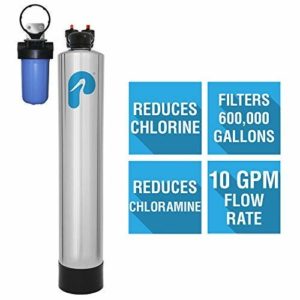
If you’re looking for a long-lasting and effective whole house water filter, then the Pelican PC600 might just be the whole home water filter worth considering. This filter system comes with a 5-micron pre-filter to trap sediment and carbon filter media to target the most common sources of water contamination.
It is also equipped with a layer of bacteriostatic media to inhibit bacteria growth within the unit itself. Aside from that, the filter also works well to destroy 99.9% of microorganisms including cysts and Giardia. The carbon whole home water filter system is designed to capture chemicals and contaminants that are responsible for causing odor and sub-par taste.
Additionally, the whole house water filter produces a 10 GPM flow rate with 1-inch ports to deliver sufficient water flow to meet the demands of a household with up to four people with two to three bathrooms. In terms of maintenance, the home filter’s pre-filter requires semi-regular replacement every 6 to 9 months, but the carbon filtration has a long-lasting service life of up to five years or 600,000 gallons of water (whichever comes first).
Pros
- Produces up to 10 GPM flow rate.
- Exceptional customer service.
- WQA Gold Seal Certified.
- Makes pathogen-contaminated water safe for consumption.
Cons
- More expensive than other brands in a similar category.
4. SoftPro Iron Master
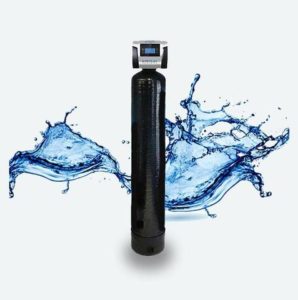
If your water well is contaminated with high levels of iron, then you need to take a closer look at the SoftPro Iron Master that’s engineered to help get rid of iron in your water supply. The water filter features Air Induction technology (AIO) that uses air as a natural oxidizer to boost iron removal to maximum levels – a feat that not many other filter brands can achieve.
All the components used in the whole house water filter are independently certified and are competitively priced, so you won’t have to worry about having to spend too much on upkeep. There’s also a lifetime warranty on the control valve and tank for peace of mind.
While this system doesn’t do it all, it is the best at helping you minimize iron levels in your home water supply. SoftPro Iron Master is the #1 choice in helping you deal with thick orange stains in your toilet bowl and shower door. However, this is not the best option to deal with sulfur odors as it removes less hydrogen sulfide compared to other models in its class.
Since this water filter does not have a sediment filter, dirt and rust particles in the water can quickly wear the parts out and it’s advisable for you to install a sediment filter separately. Nonetheless, the SoftPro Iron Master is still a well-crafted water filter that’s a breeze to use and delivers solid value.
Pros
- Removes up to 30 PPM of iron in the water.
- Reduces manganese and hydrogen sulfide.
- Programmable control valve.
- Quiet operation.
Cons
- Does not come with a sediment filter.
5. Home Master
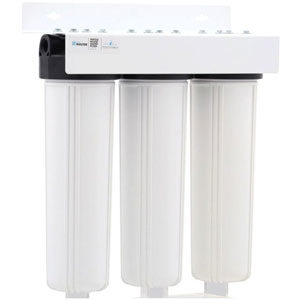
The Home Master HMF3SDGFEC is another water filter model that you can consider if your water well has high levels of iron. The whole house filter is a top seller of excellent under-sink reverse osmosis water filtration systems that consistently rank highly in all our ratings.
The triple filtration is able to remove up to 95% of sediment and chemicals including iron, sulfur, and manganese to up to 3ppm combined. This means that your house water will not only look clear but also smells better.
While the water filter has a smaller and simpler operation, the whole house well water filtration system includes three important stages:
- A multi-gradient density sediment filter for finer filtration and greater holding capacity with filtration from 25 to 1 micron.
- A radial flow iron filter that reduces iron in water up to 3ppm.
- Radial flow granular activated coconut shell carbon media to remove chemicals.
The whole house filter system comes with extra-large cartridges for longer performance and shorter maintenance to help owners decrease long-term costs. On top of that, the oversized fittings even encourage brisk water flow of up to 15 GPM so that it doesn’t reduce water pressure.
The filters are also compatible with 1-inch plumbing and come ready with everything you need for DIY assembly. The systems are backed by a two-year limited warranty and superior customer service should you have any inquiries.
The Home Master HMF3SDGFEC well water whole house filter helps many homeowners solve one of the worst common water problems: high iron levels without the sky-high cost. The water filter will help you kiss unsightly orange stains on your bathroom fixtures goodbye and replace it with crystal-clear, better-tasting water at an economical price.
However, this model does not come with any filter change indicator, bypass valve, or other flashy features. But if you value performance over bells and whistles, then this is definitely a cost-effective top performer for your home.
Pros
- Ideal for wells with high levels of iron.
- Do not reduce water pressure.
- Low-maintenance design.
- NSF certified components.
- Straightforward and easy installation.
Cons
-
No filter change indicator, bypass valve, or other flashy features.
6. Express Water Heavy Metal
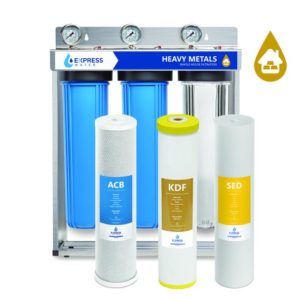
If you’re looking for a whole home water filter that can help you tackle heavy metals, then the three-stage system from Express Water is a specialty system that’s perfect for you. The whole house water filter features a triple-stage well water filtration system to capture more than 80 contaminants including sediment, chlorine, pesticides, pharmaceuticals, and industrial solvents, plus other dangerous minerals like mercury, arsenic, and lead.
The KDF filter media in stage 2 takes on heavy metals like iron, lead, mercury, and aluminum. It is also able to effectively get rid of chloramine, hydrogen sulfide, and arsenic. On top of removing harsh chemicals, the KDF 85 media inhibits the growth of microorganisms within the system to ensure that the water is safe and tastes fresh.
Finally, the activated carbon filter in stage three captures chemicals like chlorine, pesticides, and trace pharmaceuticals. This is a great option for homes whose water sources are well water with high iron content or houses with older plumbing in your house that could lead to the presence of rust in your water.
With 100,000-gallon capacity, you can easily expect this system to help you generate clean water for up to a year before requiring a filter change. There are also independent pressure gauges for each cartridge to alert you when it’s time for maintenance.
The water filter components are also built to last with lead-free NSF certification. The filters come with a one-year warranty and free lifetime technical support from Express Water’s dedicated customer support team.
Express Water understands how toxic lead can be, especially if it’s present in your water. However, lead is tasteless and invisible, meaning it cannot be removed with a simple sediment filter. This is why the company has made it their mission to create a water filter that features the KDF85 cartridge to help with the highest possible lead reduction in your home water supply. Overall, this water filtration system lets you and your family drink with more confidence.
Pros
- Effective at removing heavy metals.
- Low maintenance.
- Flexible floor to wall mounting options.
- Tool-free filter changes.
- Durable, food-grade cartridge housings.
Cons
- Warranty is shorter than other models.
7. iSpring 3-Stage
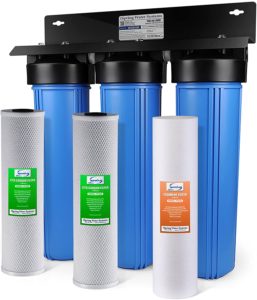
The iSpring WGB32BM is one of the best whole home water filters that’s designed to handle the filtration needs of well water. The 3-stage whole house water filter helps solve problems related to contamination from both well and city water.
- The whole house water filtration system includes the following:
- A pre-filter to collect sediment such as sand, dirt, and rust that are often found in underground wells.
- A second stage filter with a carbon block filter that targets contaminants like chlorine and VOCs. The carbon blocks are also particularly effective at refining taste and reducing a host of chemicals, from chlorine to pesticides that result in water that looks, smell, and taste bad.
- Heavy metals filter to reduce levels of iron, manganese, and other heavy metals in well water.
The water filter is equipped with premium cartridges that are independently tested by third-party companies and have been tested to meet NSF safety and performance standards. The first two stages have a filter life of up to 100,000 gallons while the heavy metal filter is only rated for 50,000 gallons. Nonetheless, the relatively low maintenance means you get to spend more time enjoying clean water rather than worrying about your filter.
iSpring multi-stage whole house water filtration system may just be your cup of tea if your water tastes as it came from a swamp. The sediment filter effectively eliminates turbidity and protects your plumbing, while the carbon block filters help remove taste impurities to deliver the freshest-tasting water possible.
Maintaining the water filter system is also painless with a long life capacity that can fill more than half-million reusable water bottles between filter changes. All in all, the iSpring 3-Stage Well Filtration System is a bargain that works great for both your wallet and the environment.
Pros
- Improves water’s taste and appearance.
- Generous-capacity filters.
- Performance-certified components.
- High water pressure.
- DIY-friendly installation.
Cons
- Not equipped with filter change indicators.
- Relatively expensive upfront cost.
8. Culligan WH-HD200-C
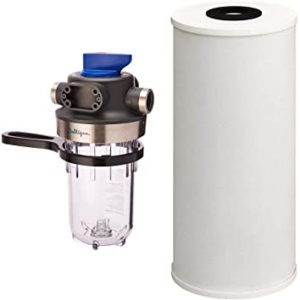
Culligan is a whole house well water filter that can help you tackle even the toughest sediment problems with the ability to remove dirt, sand, rust, and silt particles from 1- 50-micron size. Owners can even add on a carbon filter to help reduce bad chlorine taste and odor impurities.
The water filter is equipped with NSF-certified components and is engineered for safety and durability. The filters are even backed by a two-year warranty and Culligan’s commitment to service to ensure you and your family can enjoy clean water for years.
The best solution may often be one that’s the simplest, especially If your well water is already certified safe for use. There’s no point in spending extra on all the bells and whistles if it’s not really necessary.
The Culligan WH-HD200-C Water Filter System is equipped with a transparent cartridge housing for you to watch your filter work in real-time by trapping large particles before it damages your appliances and impacts your health. The best thing about this model is the whole convenience of a home water filtration system without costing a bomb.
Pros
- Affordable price.
- Flexible filter choice.
- Heavy-duty construction and NSF Certified.
- Battery-operated filter change timer.
- Integrated bypass valve.
Cons
- Filter cartridges do not come with the filter system and need to be bought separately.
9. 3M Aqua-Pure Well Water Filter & Softening System
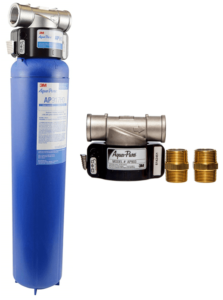
Looking for a top whole home water filter that’s effective and very easy to maintain, then you’d be hard-pressed to find another one like the 3M Aqua-Pure Well Water Whole House Filter System. This is a two-in-one whole house well water filtration and conditioner that combines the best mechanical filtration with a top-quality carbon filter and a polyphosphate-based scale inhibition system to control sediment and taste impurities.
It is equipped with a water filter that meets NSF standard 42 and a sediment filter to trap particles that are larger than 5 microns. The filter also has an activated carbon media to target chlorine and other common contaminants that can affect household appliances.
However, the biggest advantage to owning the 3M Aqua-Pure has got to be its super simple filter replacement that has a “sanitary quick change” technology. Once the filter surpasses 100,000 gallons, all you need to do is unthread the canister and replace it with a brand new one. The filter will click into place easily without resulting in any leakage or chance for contamination.
This house well water filter system method is a huge step of improvement compared to other home water filters that involve wrenches, drip pans, and a whole load of a wet mess as you wrestle the filter out. It is also worth noting that the whole house water filters and housings are integrated, so you don’t need to clean anything. While this is a minor feature, we believe that anything that makes maintenance less of a chore is always a big plus point.
You’ll need to keep in mind though, that this isn’t the most robust water filtration model on the market as it’s mainly designed to remove larger sediment particles and reduce chlorine. But if that’s your main objective, then this is a great system option.
Pros
- Sanitary filter changes that are convenient.
- Mess-free and low-maintenance.
- NSF Standard 42 certified.
- Do not reduce water pressure.
- 25-year warranty
Cons
- Costs more than other similar models in its class.
10. GE Whole House Water Filtration System
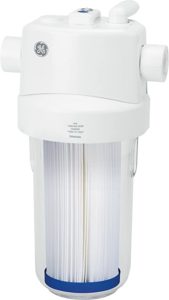
GE GXWH40L is a sediment filter that costs significantly less than many of the other picks on this list. It’s designed for brisk water flow and is an ideal pre-filter for water softeners to get rid of sand, sediment, and debris that would otherwise contaminate your water supply.
While this single-stage water filter only removes larger particles, it’s an affordable option to help improve the overall appearance and composition of your home’s water.
Owners can even choose from two cartridge options for sediment-only or sediment and chlorine removal. The water filter system also comes equipped with components that are certified to NSF 42 standards to enhance drinking and bathing water quality house-wide.
This is a great whole house water filtration model often installed to reduce chlorine and sediment that might affect appliances. The water filter is also built with heavy-duty components and convenient features like a bypass valve, cartridge change indicator light, and transparent filter housing. The filters also come with everything you need for easy installation.
The GE GXWH40L whole house water filter is a sediment pre-filter that simply won’t go wrong. Not only is this a first-rate well water filtration system, but it also guarantees high flow that’s compatible with a wide range of softeners. If you’re installing a new water filter from scratch, this is definitely a pre-filter that’s worth the added expense.
Pros
- Sturdy build that’s certified to NSF 42 standard.
- Flexible filter choice.
- Filter change indicator light and transparent filter housing.
- Aesthetically appealing.
Cons
- More expensive than other basic sediment filters.
- The initial filter is not included in the package.
11. FilterWater Eagle Whole House Water Filter System with UV Sterilizer
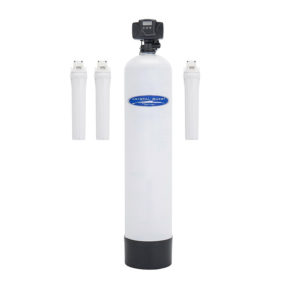
Here’s something different from the other home water filter systems. The FilterWater Eagle Home Water System comes with 14 stages of filtration into its flagship product with the addition of two sediment pre-filters to get rid of large particles and a post-filtration cartridge for extra purity.
The Eagle Whole House filtration system is available in two different capacities that you can choose depending on how many family members you have and the number of bathrooms in your house. Regardless of the capacity, the water filter system features the following stages of filtration technology:
- Stage 1 – the well water is sent through a 20” sediment pre-filter cartridge to get rid of sediment, silt, sand, and dirt. This not only gets rid of large particles, but also extends the life of the water softener, subsequent water filters, and prevents damage to control valves and pumps.
- Stage 2 – 12 – The water travels through 11 stages of the filter unit to remove hundreds of water contaminants. The filtration includes KDF-85, KDF-55, GAC (Granular Activated Carbon), Infra-red, mineral balls, ion exchange resin, and a powerful magnet (12,000 gausses) to activate magnetic resonance in the water. All these stages of filter work to ensure your water is as pure and clean as it can be.
Stage 3 – The water travels through a 20” solid carbon filter cartridge for final conditioning and removal of any remaining contaminants and VOCs that remain. - Stage 4 – Water passes through a 0.2-micron Ultrafiltration membrane (UF) that can remove bacteria, colloids, proteins, viruses, parasites, and other organic molecules highly effectively.
- Stage 5 – For further peace of mind and the ultimate protection, owners can add on an Ultraviolet Water Sterilizer System to deactivate any remaining pathogen. The system even comes in three different sizes to match your flow rate needs.
The FilterWater Ultraviolet Water Sterilizer System is an economical way of treating well water with up to 99.99% reduction in microorganisms. The UV purifier process even helps to get rid of pathogens without introducing harmful chemicals to your drinking water. This is a great choice if you’re seeking a complete solution for your well water.
Pros
- 15 stages of the whole house well water filtration system to get rid of 99.99% contaminants.
- A very comprehensive home filter system.
- Comes in various sizes and capacity to meet different demands.
Cons
- Might be expensive for some.
- High number of different filters might make maintaining the system a bit more complicated.
Types of Whole House Well Water Filtration Systems
There are mainly two categories of filters for well water: Point of use systems and whole house well water filters. Point-of-use systems will treat the water directly right before consumption such as for drinking or cooking. Whole house well water filters will clean all the well water entering your home, guaranteeing that the water from every tap is pure.
The filters are then further categorized by the filtration method – each type engineered to target different contaminants. The best whole house water filters often have a multi-stage system that utilizes several types of filters to achieve maximum contamination reduction.
Sediment Filters
Sediment filters work like strainers by removing large, suspended particles that get trap in their filter mesh. This type of filter is perfect for making well water clear and more pleasant to drink.
They also work to protect other types of filters that are prone to sediment clog when paired with multi-stage systems. However, do take note that this type of filter only removes sediments and doesn’t solve issues related to chemicals, bacteria, or minerals.
Sediment filters remove large debris, including:
- Dirt
- Dust
- Silt
- Sand
- Rust
- Carbon Filters
Carbon filters work by adsorption to permanently trap contaminants. A single gram of carbon has a surface area of 32,000 square feet for maximum filtration. The amount and quality of the carbon granules also work to determine how efficient and long the well water filter system can last.
Carbon filters excel at removing heavy metals and chemicals in the well water. They also can deodorize and improve both the taste and safety of well water. Just like the type discussed above, carbon filters are often used as pre-filters to protect other more delicate components.
Carbon filters can filter the following:
- PFAS
- Phosphate
- Select heavy metals
- Chlorine
- Chlorine byproducts including bromate and haloacetic acid
- Pesticides
- Herbicides
- Industrial solvents
- etc
Reverse Osmosis Filters
Reverse osmosis filters work by forcing water particles through a semipermeable membrane. The pores on the membrane are very much smaller and only allow water molecules through, meaning it can catch tiny particles that sediment filters and RO systems miss.
However, do take note that this type of filtration model is very slow, and they do create a significant amount of wastewater. They also do not remove all pathogens present in the well water.
RO filters can remove:
- Dust
- Silt
- Sand
- Rust
- PFAS
- Phosphate
- Select heavy metals
- Chlorine
- Chlorine byproducts including bromate and haloacetic acid
- Pesticides
- Herbicides
- Industrial solvents
- Fluoride
- Minerals
- Some arsenic
- Select microorganisms
Kinetic Degradation Fluxion (KDF) Filters
KDF filters contain high-purity copper and zinc granules that can help reduce contaminants in water via oxidation reduction. The KDF system is used to help owners reduce chlorine levels and high percentages of dangerous heavy metals like lead in the well water entering your home.
KDF filters can remove:
- Chlorine
- Hydrogen sulfide
- Mercury
- Lead
- UV Filters
UV filters use ultraviolet light to treat and kill microorganisms by rendering them unable to multiple. UV filter is the highest level of pathogen treatment on the market other than chlorination.
Water Softeners
Hard minerals present in the well water can be healthy for the body when consumed in small amounts, but these hard minerals can lead to limescale buildup in pipes and appliances. Over time, the accumulation of limescale can result in high utility bills and breakdowns.
If your well water has high-level soft hard water, then investing in a well water softener is a good idea. Water softeners remove minerals through ion exchange by trapping them in a resin to be flushed away later.
There is also another type of water softener known as salt-based softeners. This type of system is effective but they’re increasingly unwelcome due to concerns of ecology. Salt-based softeners produce briny wastewater that’s bad for the environment.
Water softeners remove minerals including:
- Calcium
- Magnesium
- Barium
- Iron less than 5 PPM
- Water Conditioners
Water conditioners are descalers or salt-free softeners that change the chemical composition of calcium and magnesium. The chemical alteration inhibits these chemicals from forming limescale. While they’re not as effective as traditional softeners, they’re inexpensive to use and do not produce wastewater.
Common Contaminants that Well Water Filter Systems Remove
So, why is it important to have water filters? Whole house filters help to remove some of the most common contaminants found in your drinking water. Here are some of the common contaminants that are effectively removed by the well water filtration systems:
Sediment
Sediment is any suspended particle or debris in water like sand, silt, clay, and rust. This can be more of a problem for water pumped from the ground as they’re usually filled with sand and small particles. A whole house sediment filter can help you remove these larger particles, and usually act as a pre-filter before passing the well water to subsequent filters.
Turbidity
Turbidity is when your water is a little cloudy caused by a large number of small particles that are not visible to the naked eye. These particles will either settle out slowly or not at all. The particles can be made up of many different things, depending on the source of water.
Microorganisms, bacteria, viruses, and cysts
Microorganisms are one of the most common contaminants in well water and contaminated internal hot water systems. Microorganisms in large and uncontrollable quantities can lead to significant health problems.
This is why most water filter manufacturers offer UV (ultraviolet) light filters as an add-on to deactivate them before consumption. The microorganisms get killed when they pass through the UV filters.
Rust and Manganese
Rust and manganese can lead to brown, red, or yellow-colored water. Rusty water has an unpleasant smell, especially when the water is hot. You can prevent and remove iron from well water by adding an iron filter.
Iron
Much like rust, iron can result in reddish stains and can lead to other problems in your house. Water with high levels of iron can encourage the growth of iron-feeding bacteria in the well water. Consuming too much iron can also lead to health problems like liver, heart, pancreatic damage, and even diabetes.
Signs of excessive iron digestion can include stomach problems, nausea, vomiting, fatigue, weight loss, and joint pain.
Sulfur
Sulfur smells like rotten eggs as it reacts with the air to produce hydrogen sulfide. Sulfur is often a byproduct of bacteria in water and drinking too much of it can lead to diarrhea or dehydration.
Your hot water system, while comfortable, can also be a breeding ground for all sorts of bacteria. If you begin to smell any sulfur or bad water taste, you should immediately investigate the water quality.
Installation For Whole House Water Filter Systems
Installing a whole-house filter is more difficult than a point-of-use unit and may involve plumbing. But the installing process is certainly doable if you’re handy around the house and have the necessary tools like tubing, fittings, and a pipe cutter.
Here’s a brief overview of what you need to do to install a whole house water filter system without calling a plumber:
1. Follow the manufacturer’s instructions to properly activate any filtration media.
2. Shut off the main water supply.
3. Drain off any remaining water in the pipes and system.
4. Cut the main water line with a pipe cutter.
5. (Optional) Install shut-off valves on both sides of the system. This will aid in future maintenance. A bypass valve may not be necessary if the water filter already has one built-in.
6. Connect the whole house filter ensuring it’s facing in the right direction. Use Teflon tape on all threads for sealing and adapters on ports to prevent leaks.
7. Turn the water back on.
8. Open all valves except the bypass.
9. Use more Teflon tape if there are leaks.
10. Flush the entire water system for several minutes until the water becomes clear.
Whole House Water Filter For Well Maintenance
Whole house well water filter systems use a large media tank that does not require maintenance. However, the sediment pre-filter will need to be replaced regularly. Cartridge filters also need to be replaced every now and then for optimum performance. Here are a few steps to take when doing filter replacement:
1. Turn off the water supply.
2. Drain off all remaining water in the tank.
3. Remove the first filter housing, take out the old filter, and insert the new one.
4. (Optional) Clean the filter housing with soapy water or bleach solution and rinse thoroughly.
5. Screw the filter housing back on.
6. Slowly turn the water supply back on and ensure no leaks.
7. Flush the new filters as per manufacturer instructions.
Conclusion: Get A Well Water Filter Now!
You and your entire family will benefit by installing a whole house water filtration. With this, you can be sure that the water you consume, cook with, and bathe in does not contain harmful and damaging contaminants. While installing a whole house water filter system is not a small expense, the long-term benefits to your health and the longevity of your household appliances outweigh the cost.
In most cases, whole water filters require little to no maintenance and are super easy to install. If your well water isn’t as pure as it should be, then a well water filtration system is a simple, cost-effective solution for a lifetime of health improvement.
Frequently Asked Questions (FAQs)
Do I have to filter well water?
The decision on whether you need to filter well water can be decided after you’ve tested the water. If the water testing shows no worrisome contaminants, it may not be necessary to install a water filter.
Yet, many homeowners still choose to install one as it enhances the taste or softens the water to safeguard home appliances. Others also simply feel safer with a water filter to protect their family against the unknown.
Does a whole house water filter affect water pressure at the tap?
Yes, a whole house water filter can affect water pressure at the tap. However, not all house filters will affect outgoing water pressure equally. A thorough sediment filtration with small filter sizes usually results in higher pressure drops, whereas whole home water filter systems that use activated carbon pose less of an effect on water pressure.
How much does it cost to install whole house water filtration systems?
The cost of installing whole house water filtration systems will depend on your existing plumbing setup. Nonetheless, you can expect a bare minimum installation cost of somewhere between $300-500 USD. With that being said, it is significantly much cheaper if you were to complete the project yourself.
Can I drink water filtered provided by a whole house filtration system?
Yes, filtered water by a whole house filtration system can be drunk. But there’s no guarantee that is free from harmful contaminants. That’s why we recommend for you conduct thorough testing before purchasing a system.
Where should I install a whole house water filter?
A whole house water filter can be installed anywhere (as long as it’s safe from freezing temperatures), but it needs to be connected to the main water supply. Most owners install the house well water filter system in the garage or basement.
How often should I replace the water filter?
Filter components need to be replaced according to the manufacturer’s instructions. With proper care, frames, housing, and fittings can last a lifetime. Several high-capacity filtration models come with a single disposable tank that can be discarded once they’ve reached capacity.
These models do not require maintenance and can offer ultimate value for homeowners who want a fix-it-and-forget-it filter.
Can I use a reverse osmosis filter for my well water?
Yes, but it may not the best option for your well water. Regardless, reverse osmosis systems is an effective whole house filtration systems. However, well water has high acidic, high iron, contains sediments and harness level which can cause damage to the membrane of the reverse osmosis water filter. Hence, you’d install a pre-treatment water filter to increase the life span of your filter for well water.